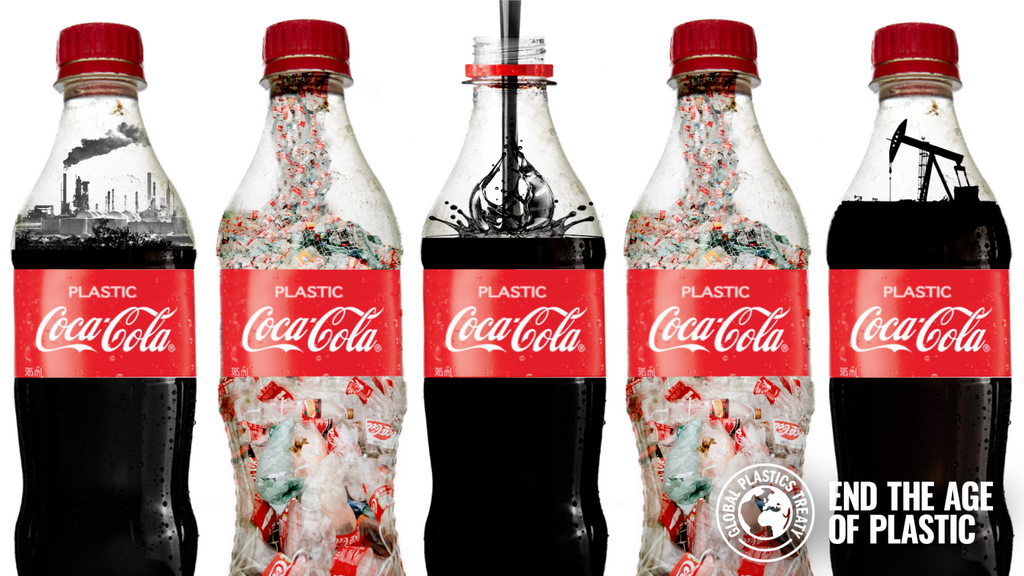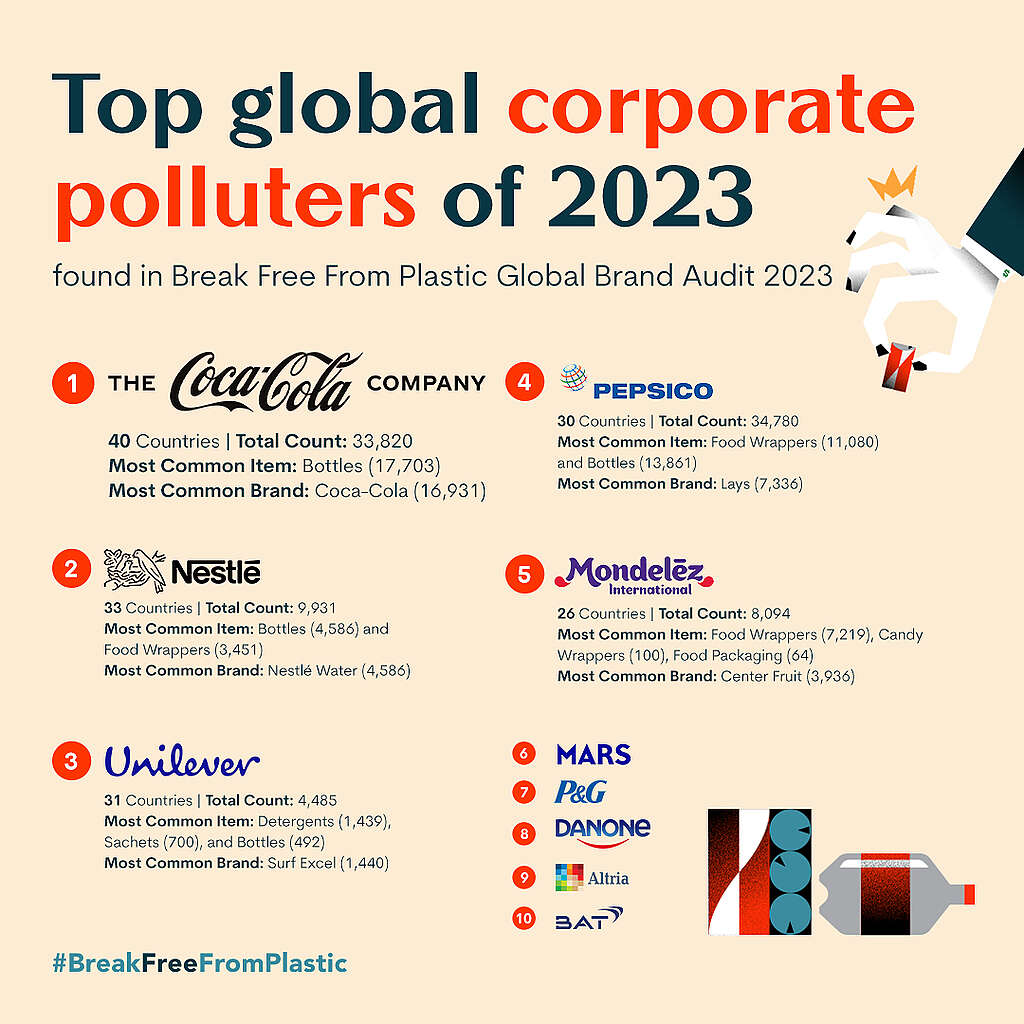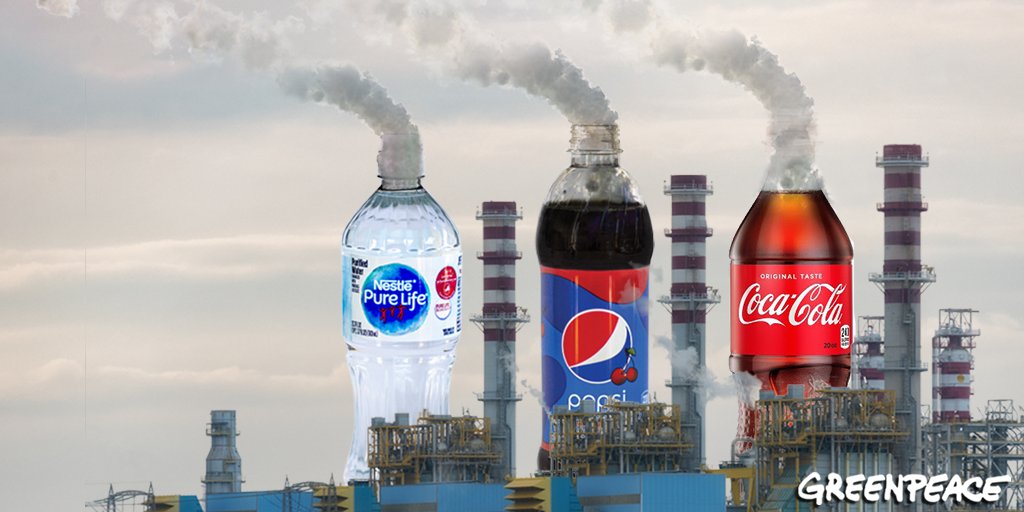- Coca-Cola is the worst plastic polluter in the world for the sixth year in a row
- Plastics are made from fossil fuels, the production of which makes the climate crisis worse
- Single-use plastics, like Coca-Cola’s plastic bottles, are one of the biggest contributors to plastic pollution
Table of contents
Coca Cola’s role in plastic pollution is emblematic of plastic itself. It appears to be clean, shiny and convenient, much like plastic. Slick appearances, good public relations and its often close proximity to food and beverage would have you believe it is safe, clean and sterile. Like Coke itself, the truth is that plastic is not healthy at all.
In reality, it represents the insidious stench of global plastic pollution, especially with its connection to fossil fuels. Plastic pollution, including single use plastic bottles, has invaded every part of the human experience with devastating impacts. The world desperately needs change, it needs solutions to end the age of plastic.
Plastic pollution is suffocating the planet and killing our wildlife. With severe impacts on marine life, ecosystems, and human health, the major contributor to this crisis is the world’s worst plastic polluter- Coca-Cola. The polluter has earned the dubious title of the world’s worst plastic polluter in successive global brand audits, but it is the inextricable link between plastic production and the oil industry that makes this issue utterly dirty.

Coca-Cola: a global plastic menace.
More and more, Coca-Cola’s signature red bottles are becoming representative of environmental harm. The polluter sells more than 100 billion single-use plastic bottles each year with many ending up in landfills and the ocean.
The company’s widespread use of single-use plastic bottles has contributed significantly to the global plastic pollution crisis. In a shocking revelation, a 2023 report from Break Free From Plastic’s Brand Audit found there were more Coca-Cola Company branded items collected than the next two top polluters combined.
In the 2023 Brand Audit, plastic waste from 250 brands were collected and audited by 8,804 volunteers in 41 countries. Together they collected and audited 537,719 pieces of plastic waste.

The analysis revealed that once again, the top global plastic polluter is The Coca-Cola Company, exposing how corporate voluntary commitments are not effectively reducing these companies’ devastating environmental impacts.
Since 2018, global cleanups and brand audits have been carried out by more than 200,000 volunteers in 87 countries and territories to identify the companies polluting the most places with the most plastic waste. Over all five years, more Coca-Cola Company branded items were collected than the next two top polluters combined. To put it simply, Coca-Cola is the worst plastic polluter in the world!
While you’re here… would you sign our petition before you read on?
PETITION: Ban the bottle
The plastic-oil connection
Plastic polluters like Coca-Cola won’t speak about plastic’s dirty relationship with fossil fuel companies. One of the less-discussed aspects of the plastic pollution crisis is its intimate connection to the oil industry as the production of plastic is heavily reliant on fossil fuels. Primarily derived from crude oil and natural gas, it’s estimated that around 99% of plastic is made from chemicals sourced from fossil fuels highlighting the direct link between the plastic and oil industries. Oil and plastic polluting petrochemical giant INEOS and fossil fuel behemoth TotalEnergies have both attempted to greenwash their practices in recent times by sponsoring New Zealand Rugby and the Men’s Rugby World Cup respectively.
When the NZ Rugby was announced, Greenpeace Aotearoa plastics campaigner Juressa Lee said: “At the time the deal was struck with oil and plastic polluting petrochemical giant INEOS, Greenpeace Aotearoa vehemently opposed it. INEOS is responsible for driving us deeper into the climate crisis, and fouling the oceans with plastic pollution.”

The circular economy imperative
To combat the plastic pollution crisis, a transition to a circular economy is imperative. This model emphasizes reducing, reusing, and recycling materials, thereby minimizing waste and environmental impact. It requires a collective effort from corporations, governments, and consumers to shift away from the current linear “take-make-dispose” model.
Kaupapa Māori Social Scientist Matt Peryman profoundly explained why plastics can never be circular. Peryman insists that the concept of ‘circularity’ must be grounded in reality by incorporating Indigenous knowledge and values – mātauranga (knowledge) and tikanga Māori (practices and behaviour) here in Aotearoa New Zealand – in relation to the impacts of linear systems on local contexts and environs. “From there, we can understand that if a system, practice, or product entails a risk of releasing harmful contaminants, it is not tika, and it is definitely not circular.”
Demanding accountability
As consumers, we hold the power to demand change from corporations like Coca-Cola. By supporting initiatives like global brand audits and advocating for more sustainable practices, we can push companies to take responsibility for their environmental impact. It’s time to hold the world’s worst plastic polluters accountable and work towards a future free from the shackles of plastic pollution.
More than 100,000 people have signed our petition to ban single-use plastic bottles and implement refill and reuse solutions. But our job is not done and we must continue advocating for a ban.
The world requires change because we have so much to live for.It is frustrating and painful to observe plastic pollution desecrate so much of our natural spaces. No one wants to see piles of plastic waste destroying communities, or our birdlife dying as a result of ingesting plastic, or single use plastic bottles littering our beaches.
Our world is beautiful and equally so are the diverse species and biodiversity that we share it with. There is so much worth fighting for because we have so much to live for. We can chart a new course for the world that endorses circularity and ends the age of plastic, but we must work together to achieve this. We can do it if we band together to ensure future generations live in a world where they thrive.

Call on the NZ Government to ban unnecessary single-use plastic bottles* in NZ, and to incentivise reusable and refillable alternatives.
Take Action


